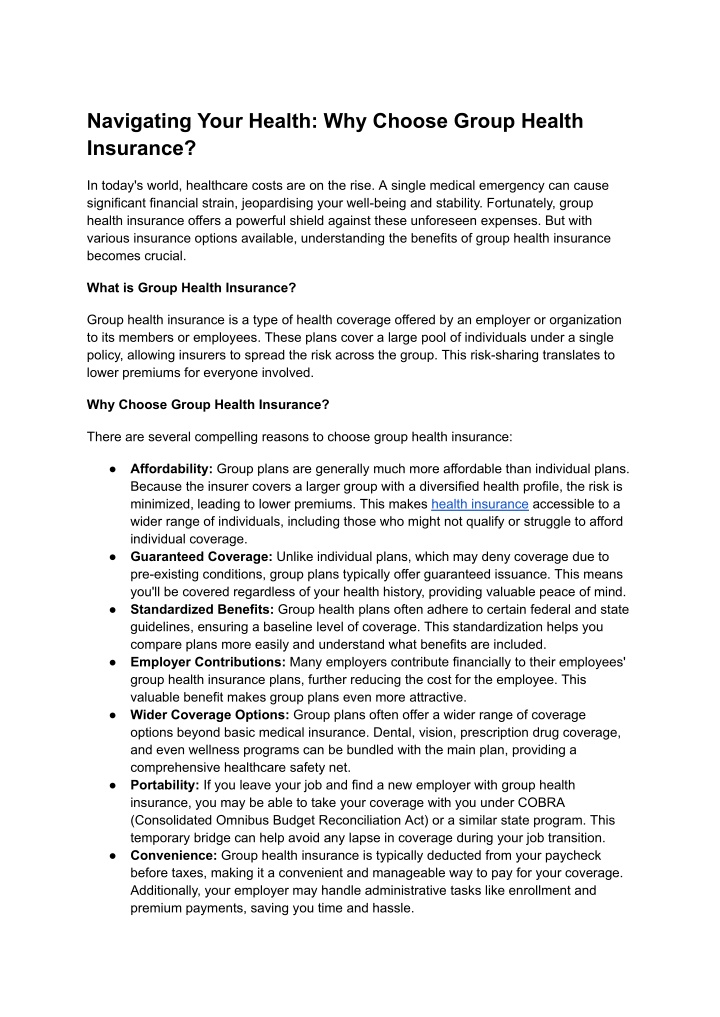
GROUP HEALTH INSURANCE
GROUP HEALTH INSURANCE
Download Presentation

Please find below an Image/Link to download the presentation.
The content on the website is provided AS IS for your information and personal use only. It may not be sold, licensed, or shared on other websites without obtaining consent from the author. If you encounter any issues during the download, it is possible that the publisher has removed the file from their server.
You are allowed to download the files provided on this website for personal or commercial use, subject to the condition that they are used lawfully. All files are the property of their respective owners.
The content on the website is provided AS IS for your information and personal use only. It may not be sold, licensed, or shared on other websites without obtaining consent from the author.
E N D
Presentation Transcript
Navigating Your Health: Why Choose Group Health Insurance? In today's world, healthcare costs are on the rise. A single medical emergency can cause significant financial strain, jeopardising your well-being and stability. Fortunately, group health insurance offers a powerful shield against these unforeseen expenses. But with various insurance options available, understanding the benefits of group health insurance becomes crucial. What is Group Health Insurance? Group health insurance is a type of health coverage offered by an employer or organization to its members or employees. These plans cover a large pool of individuals under a single policy, allowing insurers to spread the risk across the group. This risk-sharing translates to lower premiums for everyone involved. Why Choose Group Health Insurance? There are several compelling reasons to choose group health insurance: Affordability: Group plans are generally much more affordable than individual plans. Because the insurer covers a larger group with a diversified health profile, the risk is minimized, leading to lower premiums. This makes health insurance accessible to a wider range of individuals, including those who might not qualify or struggle to afford individual coverage. Guaranteed Coverage: Unlike individual plans, which may deny coverage due to pre-existing conditions, group plans typically offer guaranteed issuance. This means you'll be covered regardless of your health history, providing valuable peace of mind. Standardized Benefits: Group health plans often adhere to certain federal and state guidelines, ensuring a baseline level of coverage. This standardization helps you compare plans more easily and understand what benefits are included. Employer Contributions: Many employers contribute financially to their employees' group health insurance plans, further reducing the cost for the employee. This valuable benefit makes group plans even more attractive. Wider Coverage Options: Group plans often offer a wider range of coverage options beyond basic medical insurance. Dental, vision, prescription drug coverage, and even wellness programs can be bundled with the main plan, providing a comprehensive healthcare safety net. Portability: If you leave your job and find a new employer with group health insurance, you may be able to take your coverage with you under COBRA (Consolidated Omnibus Budget Reconciliation Act) or a similar state program. This temporary bridge can help avoid any lapse in coverage during your job transition. Convenience: Group health insurance is typically deducted from your paycheck before taxes, making it a convenient and manageable way to pay for your coverage. Additionally, your employer may handle administrative tasks like enrollment and premium payments, saving you time and hassle.
Understanding Group Health Insurance Plans: There are various types of group health plans, each with its own structure and benefits. Here's a breakdown of some common options: Preferred Provider Organization (PPO): PPO plans offer a network of doctors and hospitals that have contracted with the insurer to provide discounted services. You have the flexibility to use in-network providers for lower costs or go out-of-network, but at a higher cost. Health Maintenance Organization (HMO): HMO plans require you to choose a primary care physician (PCP) within the network for most of your medical care. Your PCP will provide referrals to specialists within the HMO network if necessary. HMO plans typically have lower premiums compared to PPO plans but offer less flexibility in choosing providers. Point-of-Service (POS): POS plans combine features of HMO and PPO plans. You typically have a designated PCP within the network for routine care, but you may also choose to see out-of-network providers for a higher cost. High-Deductible Health Plan (HDHP): HDHP plans have lower monthly premiums but come with a higher deductible, which is the amount you must pay out-of-pocket before the insurance plan kicks in. These plans are often paired with Health Savings Accounts (HSAs) which allow you to save pre-tax dollars to cover qualified medical expenses. Choosing the Right Group Health Plan: Selecting the right group health plan depends on your individual needs and circumstances. Here are some factors to consider: Your health status and anticipated medical needs: If you have pre-existing conditions or anticipate needing frequent medical care, a plan with a wider network and lower out-of-pocket costs might be ideal. Your budget: Consider your monthly income and how much you can comfortably afford for premiums and out-of-pocket expenses. Your family situation: If you have dependents, factor in the cost of covering them under the plan. The type of plan offered by your employer: Many employers offer a choice between different plan options. Carefully review the details of each plan to determine which one best suits your needs.






















